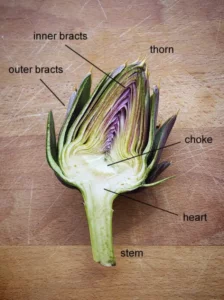Crema de Alcachofas Asadas (Roasted Artichoke Spread)
Gluten Free · Dairy Free · Vegan Friendly + Vegetarian
19 Oct · Written by Raquel Jones

HISTORY & INTERESTING FACTS
Artichokes are exquisite vegetables. Scientifically labelled asCynara scolymus,they not only provide a rich array of essential vitamins and minerals but also hide a plethora of remarkable qualities. There's a profound satisfaction in the meticulous preparation of these culinary gems from scratch.
Interestingly, the culinary tale of artichokes unfolds across various cultures. Italians are passionate devotees of these green wonders, closely followed by the Spanish and the French.
My recipe transports me to the nostalgic days of my childhood, where the presence of peas, broad beans, artichokes, and asparagus in our vegetable patch signalled the arrival of spring and the anticipation of warm summer days by the seaside.
The Ancient Greeks and Romans considered artichokes a delicacy and believed they possessed aphrodisiac properties.
Did you know that artichokes are, in reality, flower buds harvested before they unfurl into blossoms? If allowed to bloom, they reveal stunning purple-blue flowers.
This spread is often made with artichokes blended with olive oil, garlic, lemon juice, and sometimes cheese. I have also made this with Jerusalem artichokes [Helianthus tuberosus], which are unlike globe artichokes but still have a sweet, nutty flavour—especially when cooked.
This dish is also a great substitute for avocado in many other recipes. I hope you relish this creation as much as I do!
Bon Profit! Raquel x
Crema de Alcachofas Asadas y Ajo (Roasted Artichoke & Garlic Spread)
Yields: 1 cup
INGREDIENTS
- 350g artichoke hearts, quartered (see how to prepare artichokes from scratch below OR buy canned hearts in water, not oil eg.Always Fresh Artichoke Hearts)
- 4 garlic cloves
- 2 tbsp apple cider vinegar
- 1/4 tsp salt
- 1/4 cup extra virgin olive oil
- pinch of onion powder
METHOD
Part 1. Prepare Artichokes
Note: Medium/large ‘globe’ artichokes are bestOR skip this step and use canned artichoke hearts (I won't tell!)
- Firstly, get a large bowl and fill it with 3 cups of water and 1/2 cup of vinegar.
- Begin by cutting off the stem at the base of the artichoke.
- Peel off the outer and inner leaves/bracts until you reach the heart, dipping the artichoke in the acidulated water from time to time whilst you peel.
- Trim the base and cut around it, removing the remaining leaves/bracts that are harder to peel.
- Scrape away the choke and drop the heart into the acidulated water.
- Continue with the remaining artichokes until you have extracted all hearts and placed them in the water until ready to cook.
Part 2. Prepare Dip
- Preheat grill to 250 degrees Celsius.
- Place the artichoke hearts onto a lined baking tray and grill for 10 mins, turning them occasionally until browned all over.
- Once nicely cooked, place artichoke hearts and all other ingredients into a food processor and blitz until smooth and creamy.

Anatomy of an Artichoke
WINE MATCHING & SERVING SUGGESTIONS
Pairing wine with certain foods can indeed be a culinary challenge, and some vegetables, like artichokes, asparagus, broccoli, and brussel sprouts, fall into this category. Their distinctive, somewhat sulphur-like, meaty flavour can clash with many wines, creating an unpleasant taste experience. Additionally, the inherent bitterness in most green vegetables calls for a wine that lacks bitterness.
In such cases, it's often wise to set aside the red wines and opt for a white variety that complements these complex flavours. For example,our chardonnay or pinot griscan be excellent choices. Our Estate Chardonnay has minimal oak with lovely natural acidity.
Also, consider "green" wines, which boast flavours and aromas akin to nettles or grassiness. Ouralbariño, known for its vibrant and fresh notes, is a delightful option that pairs harmoniously with this glorious artichoke dish. Alternatively, ourAmphora Blanco, with its blend of albariño and chardonnay made in clay, with no oak addition at all, is another wonderful pairing.
Liquor Licence Number: 36151142
